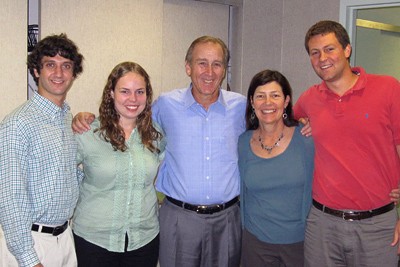Recycling mattresses to help former convicts and the homeless find jobs
By Kathy Hovis
A group of Cornell alumni are designing a business with one goal in mind: creating jobs for workers who employers often overlook.
Katie Broadbent '09 and Arthur Maas '09 are working with Andy Potash '66 to create work for people who have been incarcerated and those who are chronically homeless.
"Up to now, I've written checks for causes I thought worthy and served on not-for-profit boards, both of which are important, but neither of which were particularly emotionally satisfying to me," said Potash, who recently stepped down as CEO of an insurance program manager he co-founded and ran for 11 years. "I've always liked starting businesses. ... I began to wonder what it would look like to start a business that would employ those in society who are normally shunned by employers," he said.
So he founded Distinguished Social Ventures (DSV). "We are committed to maximizing economic profitability, employee growth and environmental sustainability," says Potash, who has a Bachelor of Arts in government from the College of Arts and Sciences.
With the help of Entrepreneurship@Cornell, he recruited Broadbent, who has a Bachelor of Arts in history from the College of Arts and Sciences, and Maas, who has a Bachelor of Science in policy analysis and management from the College of Human Ecology. With Potash's wife, Andrea '66, and his son, Scott '98, they set three goals: determine which underemployed group to help; figure out what business to start; and write a business plan. They've completed the first two goals and are closing in on the third.
First, they met with more than 50 organizations around the country that work with or employ their target populations and determined that plenty of high-quality employees would be available to staff their business.
The need is profound, DSV's research has found. People who are formerly incarcerated or chronically homeless are significantly disconnected from the workforce, often due to their low level of education and to illegal discrimination. More than 60 percent of some 3,000 urban employers surveyed said they would "probably not" or "definitely not" knowingly hire someone who had been incarcerated, DSV found.
Second, DSV explored a number of businesses -- a hamburger joint, a bakery and "thrift stores" for building materials and cars -- and settled on a mattress recycling operation.
Although they are 90 percent recyclable, mattresses overburden landfills because they are difficult to compress. DSV's business would collect unusable mattresses from retailers and large institutions, dismantle them by hand and resell the foam and steel components; on post-consumer markets, used materials can have as much value as the original.
Broadbent and Maas have done "amazing" research for DSV, Potash said. "They have found resources that we wouldn't have found on our own, have been part of every key discussion and have helped make every important decision."
That research has been one of the most exciting parts of his position, Maas said. "People really have a desire to help a cause that can have a tangible and direct impact on marginalized people and their families," he said. "Everyone we've met has helped us move forward, and I have drawn a lot of motivation from the collegiality, unique insights and encouragement we have received in meetings."
DSV hopes to get the business ready to launch by July 2010. Their immediate goals are to complete the business plan, find affordable warehouse space and secure at least two large clients to supply mattresses.
"I love coming to work," Broadbent said. "Every day we come closer to having a real and positive impact, both on peoples' lives and on the environment."
Kathy Hovis is a writer with Entrepreneurship@Cornell
Media Contact
Get Cornell news delivered right to your inbox.
Subscribe